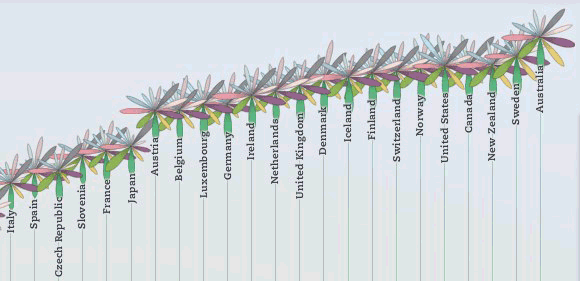Here are a few of the data stories that caught my attention this week:
Visualizing a better life
How do you compare the quality of life in different countries? As The Guardian’s Simon Rogers points out, GDP has commonly been the indicator used to show a country’s economic strength, but it’s insufficient for comparing the quality of life and happiness of people.
To help build a better picture of what quality of life means to people, the Organization for Economic Cooperation and Development OECD built the Your Better Life Index. The index lets people select the things that matter to them: housing, income, jobs, community, education, environment, governance, health, life satisfaction, safety and work-life balance. The OECD launched the tool last year and offered an update this week, adding data on gender and inequality.

Screenshot from OECD’s Your Better Life Index.
“It’s counted as a major success by the OECD,” writes Rogers, “particularly as users consistently rank quality of life indicators such as education, environment, governance, health, life satisfaction, safety and work-life balance above more traditional ones. Designed by Moritz Stefaner and Raureif, it’s also rather beautiful.”
The countries that come out on top most often based on users’ rankings: “Denmark (life satisfaction and work-life balance), Switzerland (health and jobs), Finland (education), Japan (safety), Sweden (environment), and the USA (income).”
Researchers’ access to data
The New York Times’ John Markoff examines social science research and the growing problem of datasets that are not made available to other scholars. Opening data helps make sure that research results can be verified. But Markoff suggests that in many cases, data is being kept private and proprietary.
Much of the data he’s talking about here is:
“… gathered by researchers at companies like Facebook, Google and Microsoft from patterns of cellphone calls, text messages and Internet clicks by millions of users around the world. Companies often refuse to make such information public, sometimes for competitive reasons and sometimes to protect customers’ privacy. But to many scientists, the practice is an invitation to bad science, secrecy and even potential fraud.”
“The debate will only intensify as large companies with deep pockets do more research about their users,” Markoff predicts.
Updates to Hadoop
Apache has released the alpha version of Hadoop 2.0.0. We should stress “alpha” here, and as Hortonworks’ Arun Murthy notes, it’s “not ready to run in production.” However, he adds the update “is still an important step forward, as it represents the very first release that delivers new and important capabilities,” including: HDFS HA (manual failover) and next generation MapReduce.
In other Hadoop news, MapR has unveiled a series of new features and initiatives for its Hadoop distribution, including release of a fully compliant ODBC 3.52 driver, support for the Linux Pluggable Authentication Modules (PAM), and the availability of the source code for several of its components.
Have data news to share?
Feel free to email me.
 OSCON 2012 — Join the world’s open source pioneers, builders, and innovators July 16-20 in Portland, Oregon. Learn about open development, challenge your assumptions, and fire up your brain.
OSCON 2012 — Join the world’s open source pioneers, builders, and innovators July 16-20 in Portland, Oregon. Learn about open development, challenge your assumptions, and fire up your brain.
Related:
